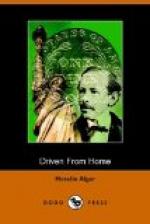“All right, Silas. He don’t look very old, though.”
“No, ma’am. I ain’t twenty-one yet,” answered Carl, who was really sixteen.
“I shouldn’t say you was. You ain’t no signs of a mustache.”
“I keep it short, ma’am, in warm weather,” said Carl.
“It don’t dull a razor any to cut it in cold weather, does it?” asked the farmer, chuckling at his joke.
“Well, no, sir; I can’t say it does.”
It was a boiled dinner that the farmer’s wife provided, corned beef and vegetables, but the plebeian meal seemed to Carl the best he ever ate. Afterwards there was apple pudding, to which he did equal justice.
“I never knew work improved a fellow’s appetite so,” reflected the young traveler. “I never ate with so much relish at home.”
After dinner they went back to the field and worked till the supper hour, five o’clock. By that time all the hay had been put into the barn.
“We’ve done a good day’s work,” said the farmer, in a tone of satisfaction, “and only just in time. Do you see that dark cloud?”
“Yes, sir.”
“In half an hour there’ll be rain, or I’m mistaken. Old Job Hagar is right after all.”
The farmer proved a true prophet. In half an hour, while they were at the supper table, the rain began to come down in large drops—forming pools in the hollows of the ground, and drenching all exposed objects with the largesse of the heavens.
“Where war you a-goin’ to-night?” asked the farmer.
“I don’t know, sir.”
“I was thinkin’ that I’d give you a night’s lodgin’ in place of the fifteen cents I agreed to pay you. Money’s very skeerce with me, and will be till I’ve sold off some of the crops.”
“I shall be glad to make that arrangement,” said Carl, who had been considering how much the farmer would ask for lodging, for there seemed small chance of continuing his journey. Fifteen cents was a lower price than he had calculated on.
“That’s a sensible idea!” said the farmer, rubbing his hands with satisfaction at the thought that he had secured valuable help at no money outlay whatever.
The next morning Carl continued his tramp, refusing the offer of continued employment on the same terms. He was bent on pursuing his journey, though he did not know exactly where he would fetch up in the end.
At twelve o’clock that day he found himself in the outskirts of a town, with the same uncomfortable appetite that he had felt the day before, but with no hotel or restaurant anywhere near. There was, however, a small house, the outer door of which stood conveniently open. Through the open window, Carl saw a table spread as if for dinner, and he thought it probable that he could arrange to become a boarder for a single meal. He knocked at the door, but no one came. He shouted out: “Is anybody at home?” and received no answer. He went to a small barn just outside and peered in, but no one was to be seen.




